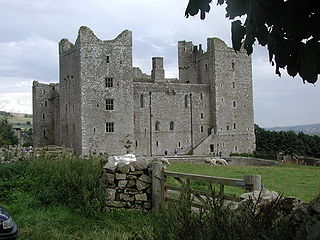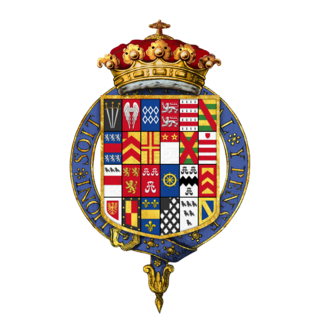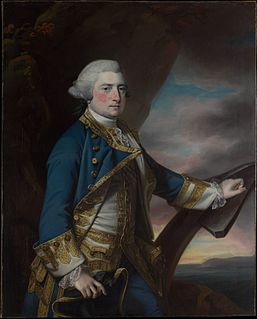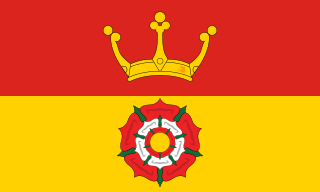
Marquess of Winchester is a title in the Peerage of England that was created in 1551 for the prominent statesman William Paulet, 1st Earl of Wiltshire. The Marquessate of Winchester is the oldest English Marquessate still in existence, and as a result, the holder of the title is considered the Premier Marquess of England. The current holder is Nigel Paulet, 18th Marquess of Winchester.

Charles Paulet, 2nd Duke of Bolton was Lord Lieutenant of Ireland, Member of Parliament for Hampshire and a supporter of William III of Orange.

Charles Paulet, 1st Duke of Bolton, was an English nobleman, the son of John Paulet, 5th Marquess of Winchester, and his first wife, Jane Savage.

Baron Bolton, of Bolton Castle in the County of York, is a title in the Peerage of Great Britain. It was created in 1797 for the Tory politician Thomas Orde-Powlett, who had previously served as Chief Secretary for Ireland. Born Thomas Orde, he was the husband of Jean Mary Browne-Powlett, illegitimate daughter of Charles Powlett, 5th Duke of Bolton, who had entailed the greater part of his extensive estates to her in default of male issue of his younger brother Harry Powlett, 6th Duke of Bolton.
Paulet, variant spelling Powlett, is a surname. Notable people with the surname include:
The Office of the Lord Lieutenant was created during the reign of Henry VIII (1509-1547), taking over the military duties of the Sheriff of Dorset and control of the military forces of the Crown. From 1569, there was provision for the appointment of Deputy Lieutenants, and in 1662 the Lord-Lieutenant was given entire control of the militia. The Forces Act of 1871 transferred this function back to the Crown, and in 1921, the office lost its power to call upon men of the County to fight in case of need.
This is a list of people who have served as Lord Lieutenant of Hampshire. Since 1688, all the Lords Lieutenant have also been Custos Rotulorum of Hampshire. From 1889 until 1959, the administrative county was named the County of Southampton.

Lieutenant-General Charles Powlett, 3rd Duke of Bolton, styled Earl of Wiltshire from 1685 until 1699, and Marquess of Winchester from 1699 until 1722, was a British politician who sat in the English House of Commons from 1705 to 1708 and in the British House of Commons between 1708 and 1717 when he was raised to the peerage as Lord Powlett and sat in the House of Lords..
Lord William Powlett was an English Member of Parliament.
This is a list of people who have served as Custos Rotulorum of Hampshire.
The holder of the post Vice-Admiral of Devon was responsible for the defence of the county of Devon, England.

Admiral Harry Powlett, 6th Duke of Bolton PC was a British nobleman and naval officer.
Harry Powlett, 4th Duke of Bolton PC, known until 1754 as Lord Harry Powlett, was a British nobleman and Whig politician. He sat in the House of Commons from 1715 to 1754, when he took his seat in the House of Lords.
The Vice-Admiral of Dorset was responsible for the defence County of Dorset, England.
John Wallop, 1st Earl of Portsmouth, of Hurstbourne Park, near Whitchurch and Farleigh Wallop, Hampshire, known as John Wallop, 1st Viscount Lymington from 1720 to 1743, was a British politician who sat in the House of Commons from 1715 to 1720, when he vacated his seat on being raised to the peerage as Viscount Lymington and Baron Wallop.
George Paulet, 12th Marquess of Winchester, known as George Paulet or Powlett until 1794, was an English courtier and nobleman.














